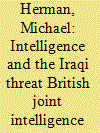| Srl | Item |
| 1 |
ID:
051549


|
|
|
| 2 |
ID:
059128


|
|
|
| 3 |
ID:
053651


|
|
|
| 4 |
ID:
108724


|
|
|
|
|
| Publication |
2011.
|
| Summary/Abstract |
Intelligence's activities provoked feelings of threat in the adversary, and its capabilities provided reassurance for its own side. Fear of espionage (and associated covert action) was common to both sides. Intrusive technical collection had a similar effect, principally through the scale of Western operations around Soviet territory, and in overflights up to May 1960. On the other hand intelligence's capabilities provided reassurance for both sides in the mutually legitimized verification of the US-Soviet strategic arms control agreements. As the Cold War progressed they also increased Western governments' confidence that they would not be caught by a Soviet surprise attack, or by an overturning of the military balance of power. Yet for both sides the threat of the opponent's intelligence activities - the enemy within - remained the more important part of Cold War psychology.
|
|
|
|
|
|
|
|
|
|
|
|
|
|
|
|
| 5 |
ID:
006800


|
|
|
|
|
| Publication |
Cambridge, University Press, 1996.
|
| Description |
xvi, 414p.
|
| Standard Number |
0521566363
|
|
|
|
|
|
|
|
|
|
|
|
Copies: C:1/I:0,R:0,Q:0
Circulation
| Accession# | Call# | Current Location | Status | Policy | Location |
| 038640 | 327.1241/HER 038640 | Main | On Shelf | General | |
|
|
|
|
| 6 |
ID:
108728


|
|
|
|
|
| Publication |
2011.
|
| Summary/Abstract |
Western governments counted on intelligence's assessments of Soviet military power, present and future. Initially these were mixtures of accuracy and exaggeration, with important effects on policy. Intelligence's quality subsequently improved, and Western defence procurement was kept in some contact with reality. Something of this may have been true on the Soviet side, in its much easier task of studying Western power. On the more important assessment of Soviet intentions, by contrast, Western intelligence was never able to develop reliable sources at the centre of the Soviet regime, and its contributions were secondary and confirmatory; while Soviet intelligence for its part selected and presented reports to emphasize the received views of Western hostility and threats.
|
|
|
|
|
|
|
|
|
|
|
|
|
|
|
|